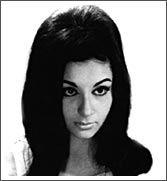
HOME | MOVIES | FEEDBACK |

If her husband and erstwhile captain of the Indian cricket team, Pataudi, is addressed as Tiger, Sharmila Tagore is justifiably called the Bengal Tigress. She was always on the hunt for challenges.
In an industry where heroines find it difficult to shatter the carapace of their images, Sharmila went from being a peaches-and-cream ingenue and a taboo breaking sex symbol to a National Award-winning actress and the doyenne of style.
She worked with him again in Devi (1960), where her portrayal of a teenage wife whose father-in-law believes she is the reincarnation of a goddess, moved America's influential film critic, Pauline Kael, to eulogise, "She is exquisite, perfect --- a word I don't use casually."
Sharmila's association with Satyajit Ray, who she thought could make even a tree act, spanned over a decade in films like Nayak (1966) Aranyer Din Ratre (1970) and Seemabaddha (1971).
Her nationwide popularity was largely courtesy Hindi films. Sharmila began her sojourn in Hindi films opposite Shammi Kapoor in Shakti Samanta's romantic musical, Kashmir Ki Kali (1964). Her beauty was more discussed than her rather stilted acting and faulty Hindi enunciation. Sharmila even contemplated leaving Mumbai but a few good roles saved the day.
A titular role in Hrishikesh Mukherjee's Anupama (1966) won her attention. While essaying Anupama, a girl ostracised by her father (as he held her responsible for the death of his wife in childbirth), Sharmila cushioned her searing silences with eloquent gazes. She brought an incongruous note to her role of a simple, shy and soft-spoken girl by sporting a stylish bouffant --- despite Mukherjee advising her against it.
Meanwhile, Samanta repackaged the well-read, fluent-in-English actress as a sex kitten and presented her in a double role as a cabaret cutie and Paris-bred Indian beauty opposite Shammi Kapoor in An Evening In Paris (1967).
Her Sharmi-la-di-dah mannerisms in this musical crime caper were considered supremely stylish in the 1960s. Her butterfly-knot blouses, daring costumes, unending eyelashes, beehive bouffants and coquettish gestures --- watch her redefine style as she sips a coke in the song Akele akele kahan ja rahe ho --- became the talk of the town.
Around this time, Sharmila appeared on a film magazine cover in a two-piece bikini and unleashed a storm of controversy. Her independant, unconventional attitude only hastened the process of her being rewarded with the tag of a 'sex symbol'. A descendant of the Rabindranath Tagore family, Sharmila wasn't happy with the sobriquet, unless it had the halo of an acclaimed actress to go with it. She married Pataudi in 1968, but continued to act.
In cohoots with her An Evening In Paris director Shakti Samanta, Sharmila managed a sensational image makeover with her award-winning performance in the golden jubilee hit, Aradhana (1969). The film offered Sharmila an opportunity to flash her dimples (Mere sapnon ki rani kab aayegi tu), as well as reveal that she was no flash in the pan as an actress.
In Aradhana, Sharmila's character goes from being a sprightly young girl to an unwed mother to a remorseless murderess to a benign, grey-haired mother.
After Aradhana, Sharmila was at the high noon of her popularity. Always one to follow her heart, the actress rebelliously took a break to deliver her first child Saif Ali Khan in 1970. A slew of offers with her Aradhana hero, superstar Rajesh Khanna, saw her soon return to the studios.
The chemistry of the Rajesh-Sharmila pair sparked off hits like Safar, Amar Prem, Daag and the artistically acclaimed Basu Bhattacharya film Aavishkar. In the poetic Amar Prem (1971), Sharmila made the most of her evocative, kohl-lined eyes to convey the pathos of Pushpa, a mostly-mute courtesan. In sharp contrast, she played the obscenity-spewing whore Kajri in Mausam (1975).
Basu Bhattacharya's Aavishkar (1973) was a revelation. The minimum makeup, no-wig look made it imperative for Sharmila to rely largely on her talent and she matched Khanna salvo for salvo as she alternated between bouts of anger and remorse while essaying the role of a wife struggling to save a marriage.
Besides Rajesh Khanna, Sharmila also made a popular team with her teen heartthrob Shashi Kapoor (Waqt, Aaamne Saamne, Suhana Safar, My Love, Aa Gale Lag Jaa, Paap Aur Punya, Anadi), Sanjeev Kumar (Charitraheen, Mausam, Grihapravesh) and Dharmendra (Devar, Mere Humdum Mere Dost, Anupama, Satyakam, Chupke Chupke).
The mid-1970s witnessed the decline of Rajesh Khanna and the emergence of a new superstar Amitabh Bachchan. Despite films like Faraar, Besharam and Desh Premee, Sharmila was not able to form a pair with him.
After winning the coveted National Award for her no-holds-barred performance in Guilzar's Mausam, Sharmila soon shifted home to Delhi and had two daughters.
She would fly down to Mumbai to do an occasional role that excited her (New Delhi Times) or one that offered her an opportunity to work with a long-time associate like Gulzar (Namkeen).
Her recent tryst with undistinguished character roles in Mann (1999) and Dhadkan (2000) however, is not on par with her reputation.
Now, Sharmila is shooting with one-time arch rival, Raakhee, for Rituparno Ghosh's Bengali film Shubho Mahurat. In her heyday, when Sharmila shot with Mala Sinha for Humsaaya and later with Raakhee for Daag, the studio would be colder than an igloo due to the icy vibes between the actresses.
Sharmila has now matured as a person as well as an actress. The one thing that remains unchanged is the fact that she is still as stylish as ever.
You might also want to read:
|
||
(c) 1996 - 2002 rediff.com India Limited. All Rights Reserved. |
|||